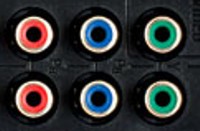Studios Repeat HDTV-Crippling Demand

The demand is for selectable output control. That would give the studios (via cable or satellite operators) the power to either cut signals to analog jacks altogether or reduce the resolution of signals passing through the component video interface to sub-HD quality. The argument, as ever, revolves around security. The studios say analog video interfaces can't be copy-protected as effectively as HDMI, and that they need control over them before they feel safe enough to offer hot movie titles on demand before their BD or DVD release dates.
Selectable output control was banned by the FCC in 2003 as part of the original CableCard agreement. The Motion Picture Association of America, the National Cable and Telecommunications Commission, and Time Warner Cable have all visited FCC offices recently to demand that the ban be lifted. On the other side of the lobbying fence are the Consumer Electronics Association and Public Knowledge. The latter, a consumer group, warns that selectable output control "would break all eleven million HDTVs in the US that don't have digital input. In essence, all the MPAA wants is to control when and how you watch the stuff you've already paid for."
ArsTechnica's Matthew Lasar has done an exemplary job in reporting this issue. See his stories here and here.
























































